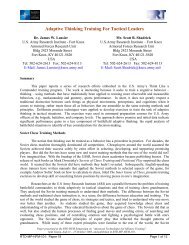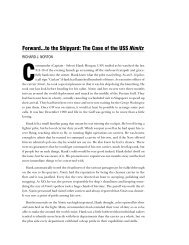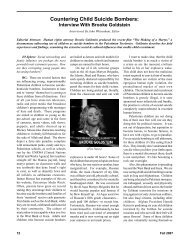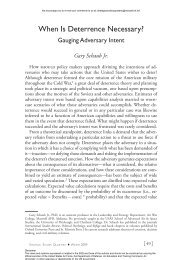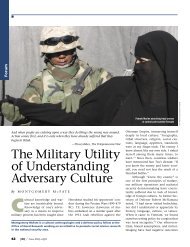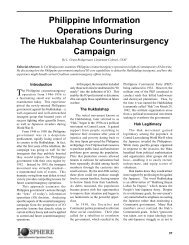Socioeconomic Roots of Middle East Radicalism
Socioeconomic Roots of Middle East Radicalism
Socioeconomic Roots of Middle East Radicalism
You also want an ePaper? Increase the reach of your titles
YUMPU automatically turns print PDFs into web optimized ePapers that Google loves.
RICHARDS 29<br />
neither men nor women were educated; in the future (and the future is now, in<br />
Iran), everyone will be at least marginally educated.<br />
Second, rapidly spreading education is part <strong>of</strong> the social background <strong>of</strong> what<br />
has been called the “crisis <strong>of</strong> authority” in Islam. 8 How is it that any engineer can<br />
issue his own fatwa when in previous centuries such pronouncements were the<br />
exclusive prerogative <strong>of</strong> a small, relatively privileged elite <strong>of</strong> traditionally educated<br />
Islamic scholars (the ’ulama)? The widespread diffusion <strong>of</strong> education, in<br />
conjunction with the absence <strong>of</strong> hierarchical controls on religious edicts in Islam<br />
(in contrast to, say, Roman Catholicism), is creating a “religious anarchy”<br />
that provides the cultural space in which radicals can promulgate and advocate<br />
their messages.<br />
Third, the quality <strong>of</strong> education leaves much to be desired. Education in the region<br />
stresses rote memorization, with little emphasis on analytical thinking and<br />
problem solving. Expectations have been raised, but the skills needed to meet<br />
those expectations have not been imparted. Millions <strong>of</strong> young men now have<br />
enough education to make the old, dirty jobs unsatisfying but have not acquired<br />
the skills needed to perform successfully in the modern, hypercompetitive,<br />
global economy.<br />
Fourth, thanks to past birth rates, the <strong>Middle</strong> <strong>East</strong> has the most rapidly growing<br />
labor force in the world; between 1990 and 1998 it grew at 3.4 percent per<br />
year. Algeria’s labor force is growing at 4.9 percent a year, Syria’s at 4.8 percent,<br />
and Yemen’s at 5.6 percent. Compare this to the labor force growth in the European<br />
Union <strong>of</strong> 0.4 percent per year during the past decade, and the American labor<br />
force at about 0.8 percent. In other words, the labor force in the <strong>Middle</strong> <strong>East</strong><br />
is growing four times faster than the American labor force and eight times faster<br />
than the European Union’s. Although the rate <strong>of</strong> growth attributable to past<br />
population growth will decelerate in some countries, such as Tunisia, during the<br />
next ten to fifteen years, declines in fertility are always accompanied (plausibly,<br />
largely caused) by an increase in female education, which enables women to enter<br />
the labor market. It is highly unlikely that the growth <strong>of</strong> the supply <strong>of</strong> labor<br />
will decelerate within the medium term.<br />
At the same time, the demand for labor has grown sluggishly. Simple economics<br />
tells us that given such a mismatch between the growth <strong>of</strong> demand and<br />
<strong>of</strong> supply, either wages will fall, unemployment will rise, or (most likely) some<br />
combination <strong>of</strong> both will occur, the precise mix varying with specific labor market<br />
structures. Government policies have not only reduced the rate <strong>of</strong> growth <strong>of</strong><br />
demand for labor but also fostered inflexible labor markets. Decades <strong>of</strong> government<br />
job guarantees for graduates have induced students to seek any degree, regardless<br />
<strong>of</strong> its contribution to productivity. Governments cannot now provide<br />
the necessary jobs, and statist policies impede private-sector job creation.



